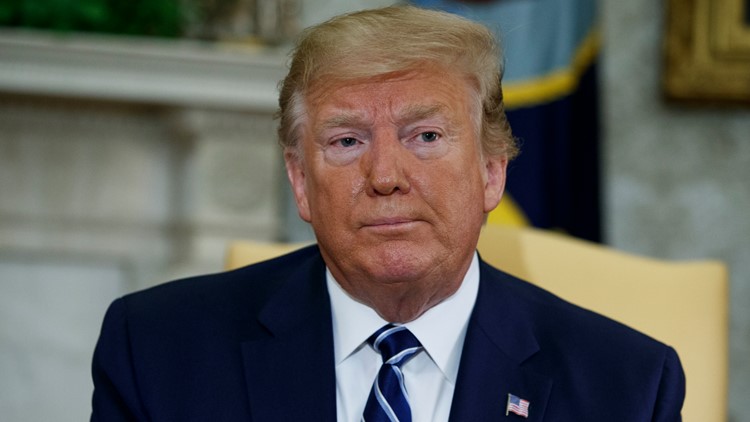President Donald Trump said Friday the U.S. was "cocked and loaded" to retaliate against Iran for downing an unmanned American surveillance drone but he canceled the strikes minutes before they were to be launched after being told 150 people could die.
Trump's tweeted statement raised important questions, including why he learned about possible deaths only at the last minute.
His stance was the latest example of the president showing some reluctance to escalate tensions with Iran into open military conflict. He did not rule out a future strike but said in a TV interview that the likelihood of casualties from the Thursday night plan to attack three sites in Iran did not seem like the correct response to shooting down an unmanned drone earlier in the day in the Strait of Hormuz.
"I didn't think it was proportionate," he said in an interview with NBC News' Meet the Press.
The aborted attack was the closest the U.S. has come to a direct military strike on Iran in the year since the administration pulled out of the 2015 international agreement intended to curb the Iranian nuclear program and launched a campaign of increasing economic pressure against the Islamic Republic.
Trump told NBC News that he never gave a final order to launch the strikes — planes were not yet in the air but would have been "pretty soon."
He said military officials came to him about 30 minutes before the strikes were to be launched and asked him for his final approval. Before signing off, he said he asked how many Iranians would be killed and was told approximately 150.
"I thought about it for a second and I said, 'You know what? They shot down an unmanned drone, plane — whatever you want to call it — and here we are sitting with 150 dead people.' That would have taken place probably within a half an hour after I said go ahead. And I didn't like it. I didn't think it was proportionate."
In Iran, Gen. Amir Ali Hajizadeh, the head of the Revolutionary Guard's aerospace division, told reporters on Friday that a U.S. spy plane with around 35 crew members was flying close to the unmanned U.S. Navy RQ-4A Global Hawk that was shot down, but that Iran chose not to target the manned aircraft. He said Iran warned the drone several times before downing it with a missile.
Late Thursday, the Federal Aviation Administration barred American-registered aircraft from flying over parts of the Persian Gulf and the Gulf of Oman, and several major airlines from around the world on Friday began rerouting their flights , including British Airways, Australia's Qantas, Germany's Lufthansa and the Dutch carrier KLM.
In his lengthy, morning tweet, Trump defended his stance on Iran amid criticism from Democrats who accuse him of having no strategy. He said he pulled out of the 2015 Iran nuclear deal, which gave Tehran sanctions relief in exchange for pledges to rein in its nuclear program, because the agreement only temporarily blocked Iran from having nuclear weapons. Trump said the nuclear deal also did not stem Iran's support of militant groups or restrain its ballistic missile program.
He said his exit from the deal and the re-imposition of sanctions on Iran has crippled its economy.
"Now they are Bust!"
"I am in no hurry," he said. "Sanctions are biting & more added last night. Iran can NEVER have Nuclear Weapons, not against the USA, and not against the WORLD!"
The overnight events, however, were a stark reminder of the serious risk of military conflict between U.S. and Iranian forces as the Trump administration combines its "maximum pressure" campaign of economic sanctions with a buildup of American troops in the region. As tensions have mounted in recent weeks, there have been growing fears that either side could make a dire miscalculation leading to war.
"We are in an extremely dangerous and sensitive situation with Iran," House Speaker Nancy Pelosi said Friday. "We must calibrate a response that de-escalates and advances American interests, and we must be clear as to what those interests are."
The Trump administration has been putting increasing economic pressure on Iran for more than a year. It reinstated punishing sanctions following Trump's decision to pull the U.S. out of an international agreement intended to limit Iran's nuclear program in exchange for relief from earlier sanctions.
Citing Iranian threats, the U.S. recently sent an aircraft carrier to the Persian Gulf region and deployed additional troops alongside the tens of thousands already there. All this has raised fears that a miscalculation or further rise in tensions could push the U.S. and Iran into an open conflict 40 years after Tehran's Islamic Revolution.
The downing of the U.S. drone — a huge, unmanned aircraft — over the Strait of Hormuz prompted accusations from the U.S. and Iran about who was the aggressor. Iran insisted the drone violated Iranian airspace; Washington said it had been flying over international waters.
The dispute has raised fears that an open conflict between the U.S. and Iran is on the horizon. Some lawmakers insisted the White House must consult with Congress before taking any actions.
Pelosi said no specific options for a U.S. response were presented at Thursday's meeting between top national security officials and congressional leaders at the White House.
Senate Majority Leader Mitch McConnell said, "The administration is engaged in what I would call measured responses." And late Thursday, House Republicans on the Foreign Affairs, intelligence and Armed Services committees issued a statement using the same word, saying, "There must be a measured response to these actions."
Rep. Adam Schiff of California, the chairman of the House intelligence committee, said the U.S. must de-escalate the situation.
"I don't think that people should be jumping down the president's throat for wanting to think this through and make sure that neither side miscalculates and we don't inadvertently end up in a war with Iran," he said. "It is also very important for the administration to understand ... that there is no congressional authorization to go to war with Iran."
____
Associated Press writers Jill Colvin, Lisa Mascaro and Matthew Lee in Washington, Jon Gambrell in Dubai, United Arab Emirates, and AP video producer Padmananda Rama contributed to this report.



